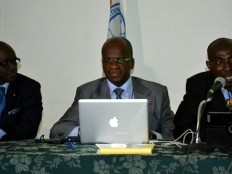 |
Thursday, the National Council of Telecommunications (CONATEL) held at the Hotel Montana, a workshop on the transition from Analog TV to Digital TV around the theme : “The challenges of the transition from analog TV to digital TV”, in the presence of several actors working in the field of telecommunications.
In his speech, Jean Marie Guillaume, Director Genaral of CONATEL, explained that digital television is a technological mutation, which will increase the quantity and will improve the cultural production of the Nation “Digital technology is the pivot around which turns the information and communication in the world and the CONATEL, has the responsibility, to conduct the Haitian society in the economy and culture of the modern world.
The transition from analog TV to digital TV is a requirement of the International Telecommunication Union (ITU), which sets the deadline to 17 June 2015, to complete the transition. However this transition was not imposed to Haiti explained Jean Marie Guillaume “This is a battle wanted,” welcoming the support of the Government, the Ministry of Public Works, of the ITU and of the Francophone solidarity for Digital (SFN) to the. For Mr. Guillaume, the modernization is first and foremost a national choice that can be done only by the leaders of a Nation.
For now, Haiti is the only country in the region where the frequency of 700 MHz are fully utilized. “Therefore, we can not completely convert our technology to 4G, which we allow the diffusion and the use of digital,” explained the Director General of CONATEL.
According to Ahmed Boraud Jean, the representative of the ITU, the transition from analog to digital in the audiovisual sector is a necessary step. “The world is in an era of new technologies, we can not prevent us to accommodate with this new way to see the world,” adding “the transition to digital is a factor that prevents the proliferation of television channels that operate outside the norms. It is also a way to prevent these different televisions to piracy and to encourage the dissemination of programs culturally richer.”
Digital television offers many advantages, including a wider range of programs, access to new services, increase in the transmission capacity of television networks, improvement of the quality of images, sound and the development of interactive applications.
Several important issues were discussed during the day, including: the technical aspects of the transition ; the legal and regulatory issues ; the problem of financing of the transition ; the economic scenarios and ITU initiatives on the digital transition. A status report on the situation in Haiti was presented late in the day as well as the example of Guinea and Niger in digital technology.
